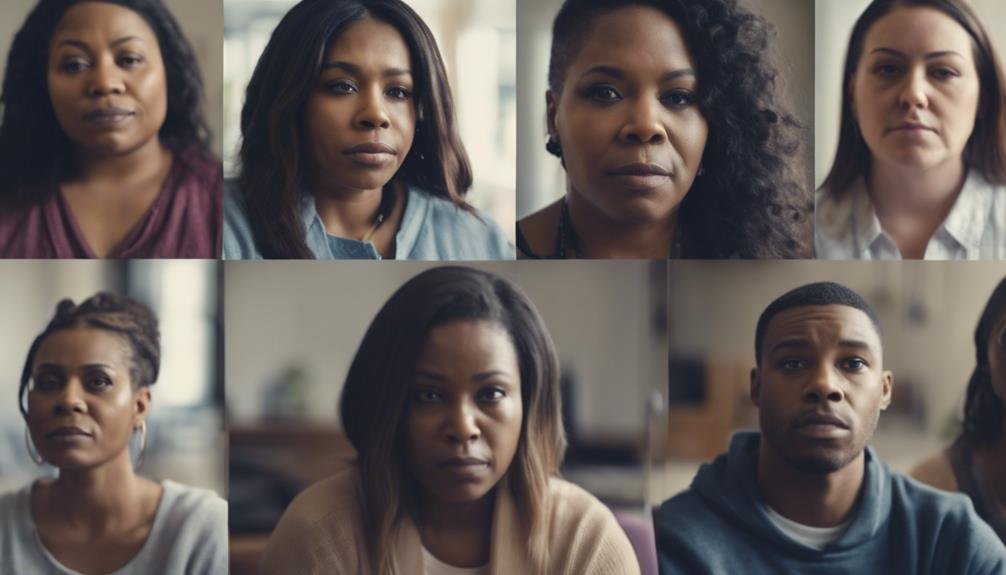When reporting domestic violence legally, recognize signs like possessiveness and control. Victims have rights to seek legal protection. Understand reporting procedures for intervention. Thorough documentation of incidents is essential. Training equips reporters on handling situations sensitively. Balancing confidentiality and reporting obligations is important. Protection From Abuse (PFA) Orders provide relief from abuse with enforceable provisions. Swiftly obtain emergency PFAs when needed. Access support through hotlines, shelters, and legal services. Different reporting options empower victims to make informed choices. Mandatory reporters must adhere to state laws for victim safety. Legal assistance and support programs offer aid in seeking protection.
Key Takeaways
- Recognize signs of abuse: physical, emotional, financial.
- Understand legal reporting procedures for intervention.
- Seek legal recourse and protection as a victim.
- Thoroughly document incidents for reporting.
- Mandatory reporters must recognize and report domestic violence.
Legal Rights for Domestic Violence Victims
When reporting domestic abuse, it’s important to understand that abuse can manifest in various forms, including physical, sexual, financial, and emotional.
Threats of harm towards oneself, children, or a partner are serious indicators of domestic violence and shouldn’t be ignored. Recognizing signs like jealousy, possessiveness, and control is essential in identifying an abusive partner.
Victims of domestic violence have the right to seek legal recourse and protection from their abusers. By reporting domestic violence, individuals can access the necessary legal assistance and protective measures, such as obtaining a Protection From Abuse (PFA) order.
These legal rights empower victims to take action against their abusers and seek the support they need to break free from the cycle of violence. Remember, you have the right to seek help and protection from the legal system when facing domestic abuse.
Protection From Abuse (PFA) Orders
When seeking protection from domestic violence, obtaining a Protection From Abuse (PFA) Order is an essential legal step victims can take to guarantee their safety and well-being.
A PFA Order is a vital legal document that provides protection from various forms of abuse, including domestic violence and harassment. It can include provisions such as restraining the abuser, removing weapons from their possession, and even granting temporary custody of children to ensure their safety.
In emergencies, victims can swiftly obtain Emergency PFAs at designated locations to secure immediate protection.
Assistance with filing for PFA relief is readily available through hotlines and domestic violence advocacy organizations, ensuring victims have the necessary support throughout the process.
It’s noteworthy that PFA Orders hold legal weight and are enforceable by law enforcement. Violating a PFA Order can lead to severe legal consequences for the abuser, emphasizing the seriousness of these protective measures in safeguarding victims of domestic violence.
Reporting Procedures for Domestic Violence
Understanding the legal reporting procedures for instances of violence within the home setting is essential for ensuring swift and appropriate intervention. As mandatory reporters, recognizing the signs of domestic violence and adhering to state laws and protocols is paramount.
Documenting incidents thoroughly is critical, including specifics of the abuse, individuals involved, and any evidence present. Timely reporting plays a significant role in ensuring the safety of victims of domestic violence and any children affected.
Training on identifying and responding to domestic violence equips mandatory reporters with the necessary skills and knowledge to handle these sensitive situations appropriately. It’s important to strike a balance between maintaining client confidentiality and fulfilling reporting obligations when dealing with domestic violence cases.
Accessing Support Services
When seeking support services for domestic violence, you can access 24/7 hotlines that offer immediate assistance and safety planning.
Additionally, temporary shelter options are available to provide a safe haven for victims and their children to escape abusive situations.
These resources are essential in providing the necessary assistance and protection for individuals facing domestic violence.
Support Hotlines Available
Numerous hotlines are available to provide 24/7 support and assistance for victims of domestic violence, ensuring accessibility to essential support services. The National Domestic Violence Hotline stands out as a pivotal resource, offering immediate help and connecting individuals with a victim advocate who can guide them through the necessary steps to safeguard their safety.
Organizations like WC&S, Crisis Center North, and Alle-Kiski Area HOPE Center also provide round-the-clock hotlines for safety planning and emotional support, irrespective of race, gender, or sexual identity. These hotlines offer a lifeline to those experiencing domestic violence, providing a listening ear, advice on safety planning, and guidance on seeking further help.
Additionally, the Pennsylvania Office of Victim Advocate extends state-wide assistance and resources to victims of abuse, further enhancing the support network available to individuals in need. By utilizing these hotlines, victims can take the first step towards safety and empowerment.
Finding Shelter Resources
Shelter resources such as Womens Center & Shelter of Greater Pittsburgh provide temporary housing, safety planning, and legal counseling for victims of domestic violence. Safety planning is vital for individuals seeking refuge from abusive environments.
Organizations like Bright Sky App offer practical information and support, easily accessible on IOS and Android platforms. In cases requiring immediate protection, individuals can seek assistance in obtaining Protection From Abuse (PFA) Orders, which can stop violent behavior, remove weapons, and provide temporary custody of children.
Emergency PFA relief is available at specific locations, and hotlines offer guidance on filing for PFA orders. Additionally, resources like Alle-Kiski Area HOPE Center, Crisis Center North, and Center for Victims extend 24/7 support services to domestic violence victims, ensuring continuous access to shelter and assistance.
It’s crucial to reach out to these shelter resources for the necessary support and protection during challenging times.
Understanding Confidential Reporting Options

Understanding the nuances of confidential reporting options in cases of domestic violence is essential for empowering victims to navigate available support resources effectively.
Confidential reporting, especially restricted reporting, involves professionals such as victim advocates and FAP clinicians who prioritize maintaining confidentiality. With restricted reporting, victims can access full FAP services without involving law enforcement or command.
Chaplains also offer privileged communication for victims seeking confidential support. However, it’s important to note that exceptions exist for immediate risk or child abuse cases where reporting may be necessary.
Differentiating between restricted and unrestricted reporting options can help victims make informed decisions about seeking help while ensuring their privacy and safety are prioritized.
State Laws on Mandatory Reporting
State laws on mandatory reporting require certain individuals to report suspected cases of domestic violence to authorities. In 29 states across the U.S., mandatory reporting laws for domestic violence exist, placing obligations on professionals like healthcare providers, teachers, and social workers to report any suspected cases they encounter.
Failure to report such cases can lead to severe legal consequences. Mandated reporters are required to provide detailed information in their reports, including the specifics of the incident, the individuals involved, and any evidence available.
Timeliness is essential in reporting these cases to safeguard the safety of domestic violence victims and any children who may be involved. By adhering to mandatory reporting laws, professionals play a critical role in safeguarding the well-being of those affected by domestic violence and contribute to the prevention and intervention efforts in such cases.
Volunteer Reporting Requirements

Volunteers participating in certain roles may be subject to mandatory reporting requirements for suspected cases of domestic violence based on their profession or designated duties. It’s vital for volunteers to understand their legal obligations regarding reporting domestic violence incidents.
Specific professions like healthcare providers or educators may have mandatory reporting laws in place that outline who must report suspected cases of domestic violence. Failure to comply with these reporting requirements can result in legal consequences in certain states.
These mandatory reporting laws are designed to protect victims of domestic violence and guarantee timely intervention to prevent further harm. Volunteers should take the time to familiarize themselves with their state’s reporting laws and protocols to fulfill their legal obligations properly.
Domestic Violence Resource Centers
Domestic Violence Resource Centers like Womens Center & Shelter of Greater Pittsburgh offer critical services such as a 24-hour hotline for safety planning and temporary shelter.
These centers provide legal counseling, court accompaniment, and support services irrespective of race, gender, or sexual identity.
Bright Sky App is a valuable resource for domestic violence victims, offering practical information and assistance, while Protection From Abuse (PFA) Orders can provide immediate relief by halting violent behavior and granting temporary custody.
Services Offered
Offering essential support and resources, Domestic Violence Resource Centers like WC&S play an important role in assisting victims of abuse. These centers provide a range of essential services to individuals facing domestic violence situations.
Victims can access 24-hour hotlines at these centers for immediate safety planning and support. Additionally, temporary shelter facilities are available for victims and their children who require a safe space to stay. Legal counseling services are also offered, helping individuals understand their rights, navigate the legal system, and obtain necessary court accompaniment when needed.
Furthermore, Domestic Violence Resource Centers have integrated technology into their services, with tools like the Bright Sky App providing confidential support accessible on IOS and Android platforms.
In more severe cases, Protection From Abuse (PFA) Orders can be obtained through these centers to stop violent behavior, remove weapons, and exclude abusers from contacting or approaching the victims. These all-encompassing services aim to empower individuals to report domestic violence legally and seek the protection they deserve.
Support Programs
Within the scope of support programs offered by Domestic Violence Resource Centers, a variety of essential services are available to assist individuals in need of immediate help and guidance. These centers, such as Crisis Center North and Alle-Kiski Area HOPE Center, play an essential role in providing safety and support to victims of domestic abuse. They offer round-the-clock hotlines for safety planning, ensuring that individuals have access to immediate assistance and resources. Temporary shelter facilities are also provided for victims and their children who require a safe space away from their abusers.
Furthermore, Domestic Violence Resource Centers offer legal counseling and court accompaniment services to help victims navigate the legal process effectively. Assistance in filing Protection From Abuse orders is another crucial service provided by these centers, ensuring that individuals can take legal steps to protect themselves from further harm.
Additionally, statewide and nationwide resources are available through centers like the Center for Victims and Pennsylvania Office of Victim Advocate, extending support beyond immediate physical safety to encompass emotional well-being and legal protection.
Legal Assistance
Legal assistance provided by Domestic Violence Resource Centers is essential for victims seeking protection from abuse and understanding the complex legal process. These centers offer important support in obtaining Protection From Abuse (PFA) orders, which are legal documents that can help stop violent behavior and provide a sense of security to those affected by domestic violence. Legal counselors at these centers can also assist victims in maneuvering through the process of obtaining temporary custody arrangements for children involved in abusive situations, ensuring their safety and well-being.
One significant advantage of seeking legal assistance from Domestic Violence Resource Centers is the ability to obtain emergency PFAs promptly. This quick action can protect victims from further harm and provide immediate relief from abusive situations.
Additionally, hotlines operated by these centers offer essential support by guiding victims through the legal steps required to file for PFA relief, ensuring that they’ve the necessary resources and information to take appropriate legal action against their abusers.
Utilizing Victim Advocate Services

Engaging victim advocate services can greatly enhance a domestic violence survivor’s ability to navigate the reporting process and access essential support resources. Victim advocates are indispensable in providing confidential support and guidance to survivors. They’re trained professionals who offer emotional support, assist in safety planning, and help in obtaining protection orders. By utilizing victim advocate services, survivors can feel empowered to make informed decisions and take steps towards safety and healing.
These advocates play a critical role in supporting survivors through every step of the process. They can accompany survivors to court hearings, provide referrals to legal assistance, and make sure that the survivor’s voice is heard and rights are protected.
Victim advocate services not only offer practical assistance but also serve as a pillar of emotional support during what can be a challenging and overwhelming time. Survivors can rely on these advocates to help them navigate the complex legal system and access the resources they need to move forward.
Breaking the Cycle of Violence
You can break the cycle of violence by understanding the dynamics of abuse and recognizing the signs early.
Seeking help safely from law enforcement, victim advocates, and support organizations is vital in ensuring your protection.
Legal interventions such as Protection From Abuse (PFA) Orders can provide immediate relief and help halt the cycle of violence.
Understanding Abuse Dynamics
Understanding abuse dynamics involves identifying the patterns of power and control used by abusers to manipulate victims in domestic violence situations. Abusers often exert dominance over their partners through emotional abuse, such as belittling, gaslighting, or isolating them from support systems.
This manipulation can create a cycle of tension-building, acute violence, reconciliation, and a temporary calm before the cycle repeats. To break this cycle, it’s essential to address underlying issues like trauma, learned behaviors, and societal norms that perpetuate abusive patterns.
Education on healthy relationships, setting boundaries, and effective communication is pivotal in preventing future abuse. By empowering individuals with the knowledge and skills to recognize abusive behaviors early on, interventions like counseling, support groups, and safety planning can be more effective in breaking the cycle of domestic violence.
Recognizing these dynamics and actively working towards healthier relationship dynamics is vital in promoting safety and well-being for victims of abuse.
Seeking Help Safely
To break the cycle of domestic violence and guarantee the safety of yourself and your loved ones, seeking help safely is essential. Developing a safety plan is a vital step in protecting yourself from further harm. Establishing a network of trusted individuals, identifying safe spaces, and having important documents and emergency contacts readily available are key components of a safety plan.
When seeking help, consider reaching out to hotlines like the National Domestic Violence Hotline, which offers confidential support around the clock. Utilize resources such as the Bright Sky app, which provides practical information on responding to abuse.
Filing for a Protection From Abuse (PFA) Order can legally put a stop to violent behavior and harassment, ensuring your safety through the legal system. Organizations like Women’s Centers & Shelters offer a range of free services, including safety planning, shelter, legal counseling, and court accompaniment.
Frequently Asked Questions
What Are the Laws on Domestic Violence in Texas?
Reporting domestic violence in Texas is essential. Legal implications exist for failure to report. Understand the reporting process, including contacting law enforcement or child protective services. Knowing the laws helps you support victims effectively.
Conclusion
In summary, reporting domestic violence legally is essential in ensuring the safety and well-being of victims. While some may fear retaliation or lack of evidence, remember that there are legal protections in place to support you.
By speaking out and seeking help, you can break the cycle of violence and create a safer environment for yourself and others. Don’t hesitate to reach out for assistance and support – you deserve to live free from abuse.







